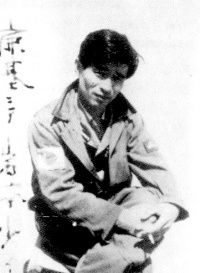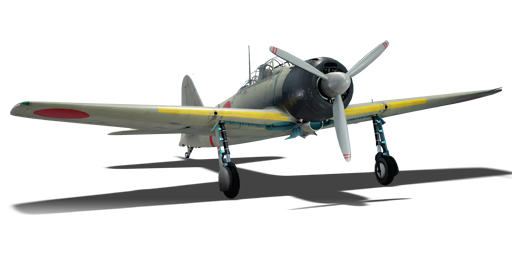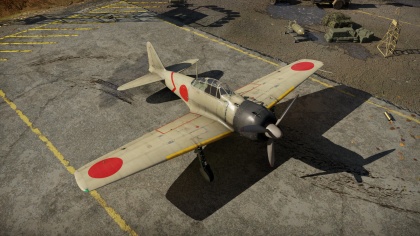A6M3
Contents
| This page is about the Japanese fighter A6M3. For other versions, see A6M (Family). |
Description
The A6M3 Reisen is a rank III Japanese fighter
with a battle rating of 4.3 (AB), 4.0 (RB), and 3.7 (SB). It has been in the game since the start of the Open Beta Test prior to Update 1.27.
General info
Flight performance
Describe how the aircraft behaves in the air. Speed, manoeuvrability, acceleration and allowable loads - these are the most important characteristics of the vehicle.
| Characteristics | |||||||
|---|---|---|---|---|---|---|---|
| Stock | |||||||
| Max Speed (km/h at 6,000 m) |
Max altitude (meters) |
Turn time (seconds) |
Rate of climb (meters/second) |
Take-off run (meters) | |||
| AB | RB | AB | RB | AB | RB | ||
| 537 | 522 | 10050 | 16.6 | 17.1 | 10.1 | 10.1 | 288 |
| Upgraded | |||||||
| Max Speed (km/h at 6,000 m) |
Max altitude (meters) |
Turn time (seconds) |
Rate of climb (meters/second) |
Take-off run (meters) | |||
| AB | RB | AB | RB | AB | RB | ||
| 578 | 556 | 10050 | 15.8 | 16.0 | 18.2 | 13.8 | 288 |
Details
| Features | ||||
|---|---|---|---|---|
| Combat flaps | Take-off flaps | Landing flaps | Air brakes | Arrestor gear |
| ✓ | ✓ | ✓ | X | ✓ |
| Limits | ||||
|---|---|---|---|---|
| Wing-break speed (km/h) |
Gear limit (km/h) |
Combat flaps (km/h) |
Max Static G | |
| + | - | |||
| 420 | ~14 | ~6 | ||
| Optimal velocities | |||
|---|---|---|---|
| Ailerons (km/h) |
Rudder (km/h) |
Elevators (km/h) |
Radiator (km/h) |
| < 280 | < 420 | < 410 | > 335 |
| Compressor (RB/SB) | ||
|---|---|---|
| Setting 1 | ||
| Optimal altitude | 100% Engine power | WEP Engine power |
| 1,850 m | 1,105 hp | 1,235 hp |
| Setting 2 | ||
| Optimal altitude | 100% Engine power | WEP Engine power |
| 5,000 m | 985 hp | 1,101 hp |
Survivability and armour
Examine the survivability of the aircraft. Note how vulnerable the structure is and how secure the pilot is, whether the fuel tanks are armoured, etc. Describe the armour, if there is any, and also mention the vulnerability of other critical aircraft systems.
Armaments
Offensive armament
The A6M3 is armed with:
- 2 x 20 mm Type 99 Model 1 navy cannons, wing-mounted (100 rpg = 200 total)
- 2 x 7.7 mm Type 97 navy machine guns, nose-mounted (700 rpg = 1,400 total)
Suspended armament
The A6M3 can be outfitted with the following ordnance:
- Without load
- 2 x 60 kg Navy Type 97 Number 6 bombs (120 kg total)
Usage in battles
The Zero is a extremely effective dog fighter with a very tight turn. Head on engagements should not be taken with any plane, especially American such as the F6F and the P51 as the Zero is very fragile. Any hit can be lethal. The engine is very weak and fuel tanks can easily catch ablaze. At the start of the match, try climbing to be able to dive on unaware opponents. The plane can exceed 700 kph allowing it to commit to very steep or long dives with slight stiffening. The biggest threats to the plane are American planes due to their guns count, but any plane can be taken in a turn fight victoriously.
In offence, aim to begin turn fights with your opponents as you will outclass them, but take very careful shots. The guns are the weakest aspect of the plane and must be used with precision. Always aim for fuel tanks or pilot as those are the most effective ways to take down enemy aircraft. Make sure to tail burning aircraft loosely as most fuel tanks are self-sealing. Bomber and other heavier planes should not be taken on as the guns are very ineffective. Only careful pilot snipes should be taken, otherwise conserve ammo for future engagements.
To defend yourself from the rear, perform a split S, which consists of rolling and turning downwards in the opposite direction, and turn to the enemy to begin engaging them. Planes will quickly overshoot and will have difficulty regaining dominance. If caught in a head on situation, roll and dive downwards towards the enemy, make sure to have no commitment.
Manual Engine Control
| MEC elements | ||||||
|---|---|---|---|---|---|---|
| Mixer | Pitch | Radiator | Supercharger | Turbocharger | ||
| Oil | Water | Type | ||||
| Controllable | Controllable Not auto controlled |
Controllable Not auto controlled |
Controllable Not auto controlled |
Separate | Controllable 2 gears |
Not controllable |
Modules
| Tier | Flight performance | Survivability | Weaponry | ||
|---|---|---|---|---|---|
| I | Fuselage repair | Radiator | Offensive 7 mm | ||
| II | Compressor | Airframe | New 7 mm MGs | 9 in (mod30) | |
| III | Wings repair | Engine | Offensive 20 mm | ||
| IV | Engine injection | Cover | New 20 mm cannons | ||
Pros and cons
Summarise and briefly evaluate the vehicle in terms of its characteristics and combat effectiveness. Mark its pros and cons in the bulleted list. Try not to use more than 6 points for each of the characteristics. Avoid using categorical definitions such as "bad", "good" and the like - use substitutions with softer forms such as "inadequate" and "effective".
Pros:
- Extremely fast turn time
- Respectable climb
Cons:
- Extremely Fragile
- Ineffective guns
History
Describe the history of the creation and combat usage of the aircraft in more detail than in the introduction. If the historical reference turns out to be too long, take it to a separate article, taking a link to the article about the vehicle and adding a block "/ History" (example: https://wiki.warthunder.com/(Vehicle-name)/History) and add a link to it here using the main template. Be sure to reference text and sources by using <ref></ref>, as well as adding them at the end of the article with <references />. This section may also include the vehicle's dev blog entry (if applicable) and the in-game encyclopedia description (under === In-game description ===, also if applicable).
In-game description
In April of 1942, a new A6M model fighter was launched. The main difference between the A6M3 model 32 and the A6M2 Model 21 was the new Sakae 21 engine (1130 hp), which had a two-stage supercharger making it more stable at higher altitudes and a propeller diameter of 3.05 m (150 mm greater than that of its predecessor). The engine was much heavier and longer than those used in previous models, so to prevent displacement of the center of gravity the engine was moved closer to the cockpit and the main fuel tank's capacity was reduced from 518 to 470 liters.
Also, the folding wingtips were removed, which increased the plane's dive speed limit but reduced its maneuverability and range. The latter side effect was particularly important as it made it impossible to use the A6M3 effectively during the 1942 campaign in the Solomon Islands. The 20-mm guns were replaced by Type 99-I model 3s, and their ammunition was increased to 100 rounds. Also, the aircraft could carry two 60-kg bombs.
A total of 343 A6M3 Model 32s were made for the Japanese navy.
Notable pilots
-
 Iwamoto flew sorties throughout the Pacific Theater in an A6M3.
Iwamoto flew sorties throughout the Pacific Theater in an A6M3.
Media
- Skin and Camouflages for the A6M3 on War Thunder Live.
See also
- Related development
- Mitsubishi A6M2 mod.21 (previous model)
- Mitsubishi A6M3 mod.22 (following model)
- Aircraft of comparable role, configuration and era
- Brewster F2A Buffalo
- Vought F4U Corsair
- Grumman F4F Wildcat
- Grumman F6F Hellcat
- Reggiane Re.2001
- IAR-81
- Macchi C.202
- Nakajima Ki-43 Hayabusa (▃Oscar)
- Supermarine Seafire
- Hawker Sea Hurricane
External links
| Mitsubishi Company (三菱商会) | |
|---|---|
| Fighters | A5M4 · Hagiri's A5M4 |
| A6M2 mod. 11 · A6M2 · A6M3 · A6M3 mod. 22 · A6M3 mod. 22Ko · A6M5 · A6M5 Ko · A6M5 otsu · A6M5 Hei · A6M6c | |
| A7M1 (NK9H) · A7M2 | |
| J2M2 · J2M3 · J2M4 Kai · J2M5 · J2M5 (30 mm) | |
| Hydroplanes | F1M2 |
| Interceptors | Ki-83 · Ki-109 |
| Bombers | G4M1 |
| Ki-21-Ia · Ki-21-I hei · Ki-67-I Ko · Ki-67-I otsu | |
| Jet Fighters | Ki-200 |
| Captured | ▃A6M2 · ␗A6M2 |
| See also | Mitsubishi Heavy Industries, Ltd. (Post-War) |
| Japan fighters | |
|---|---|
| Navy | |
| Carrier-based fighter | |
| A5M | A5M4 · Hagiri's A5M4 |
| A6M | A6M2 mod. 11 · A6M2 · A6M3 · A6M3 mod. 22 · A6M3 mod. 22Ko · A6M5 · A6M5 Ko · A6M5 otsu · A6M5 Hei · A6M6c |
| A7He | A7He1* |
| A7M | A7M1 (NK9H) · A7M2 |
| Land-based Fighter | |
| J2M | J2M2 · J2M3 · J2M4 Kai · J2M5 · J2M5 (30 mm) |
| J6K | J6K1 |
| J7W | J7W1 |
| N1K-J | N1K1-Ja · N1K2-J · N1K2-Ja |
| Fighter seaplane | |
| N1K | N1K1 |
| A6M-N | A6M2-N |
| Army | |
| Ki-10 | Ki-10-I · Ki-10-I C · Ki-10-II · Ki-10-II C |
| Ki-27 | Ki-27 otsu · Ki-27 otsu Tachiarai |
| Ki-43 | Ki-43-I · Ki-43-II · Ki-43-III otsu |
| Ki-44 | Ki-44-I · Ki-44-I 34 · Ki-44-II otsu · Ki-44-II hei |
| Ki-61 | Ki-61-I ko · Ki-61-I otsu · Ki-61-I hei · Tada's Ki-61-I hei · Ki-61-I tei · Ki-61-II Otsu Kai |
| Ki-84 | Ki-84 ko · Ki-84 otsu · Ki-84 hei |
| Ki-87 | Ki-87 |
| Ki-94 | Ki-94-II |
| Ki-100 | Ki-100 · Ki-100-II |
| Other countries | ▅F4U-1A · ▅P-51C-11-NT · ▅Bf 109 E-7 · ▅Fw 190 A-5 |
| *Imported designation of the He 112 (A6M was in development - A7M would take A7 designation after the cancelation of the A7He) | |





